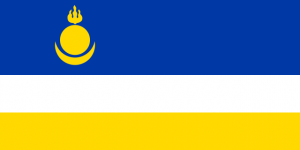Language/China-buriat/Grammar/Questions
Hi China Buriat learners! 😊
In this lesson, we will focus on questions in China Buriat. Asking questions is an essential part of communication in any language. So, if you want to improve your communication skills in China Buriat, this lesson is for you!
Let's start!
Don't hesitate to look into these other pages after completing this lesson: How to Use "Be", How to Use Have & Negation.
Basic Questions[edit | edit source]
In China Buriat, questions generally begin with the question word, followed by the verb, subject, and any additional information in the sentence. Here are some examples:
| Question | China Buriat | Pronunciation | English |
|---|---|---|---|
| What is your name? | Таны нэр юу вэ? | Tany ner yu ve? | What is your name? |
| Where are you from? | Үндэстний улсанд байна уу? | Undestnii ulsand baina uu? | Where are you from? |
| How old are you? | Найз нар хэдэн настай вэ? | Naij nar heden nastai ve? | How old are you? |
It's important to note that China Buriat doesn't use any auxiliary verbs to form questions. In fact, the same sentence can be both a statement and a question, based on the speaker's intonation.
Question Words[edit | edit source]
Here are some of the most common question words in China Buriat:
| Question Word | China Buriat | Pronunciation | English |
|---|---|---|---|
| What | юу | yu | What |
| Where | хаана | khaana | Where |
| When | хэзээ | kheeze | When |
| Why | яаж | yaaaj | Why |
| How | ямар ч | yamar chi | How |
It's important to note that some question words, such as "who" and "how many," are formed differently in China Buriat than in English. We will cover these in more detail later in the lesson.
Yes/No Questions[edit | edit source]
Yes/no questions in China Buriat are formed simply by adding a question particle "уу" (uu) after the statement. Here are some examples:
- Statement: Би гэртээ очиж байна. (Bi gertei ochij baina.) - I am going home.
- Question: Би гэртээ очиж байна уу? (Bi gertei ochij baina uu?) - Am I going home?
- Statement: Тэр байрладаг. (Ter bairladag.) - He is working.
- Question: Тэр байрладаг уу? (Ter bairladag uu?) - Is he working?
Tag Questions[edit | edit source]
Tag questions are commonly used in China Buriat to confirm or clarify information. They are formed by adding a question particle at the end of the statement. Here are some examples:
- Statement: Танд миний хувийн мэдээлэл өгөх хэрэгтэй. (Tand mini khuvuun medeelel ogokh kheregtei.) - You need to give me your personal information.
- Question: Танд миний хувийн мэдээлэл өгөх хэрэгтэй, зүгээр л биш уу? (Tand mini khuvuun medeelel ogokh kheregtei, zugeer l bish uu?) - You need to give me your personal information, right?
- Statement: Та шаланд амралтын дугаарыг жагсаалтаар өгөх хэрэгтэй. (Ta shaland amraltyn dugaarig jagsaaltar ogokh kheregtei.) - You need to provide a list of room numbers for the cleaning staff.
- Question: Та шаланд амралтын дугаарыг жагсаалтаар өгөх хэрэгтэй, зүгээр л биш уу? (Ta shaland amraltyn dugaarig jagsaaltar ogokh kheregtei, zugeer l bish uu?) - You need to provide a list of room numbers for the cleaning staff, right?
Indirect Questions[edit | edit source]
Indirect questions are used to ask for information without using direct question words. They are usually formed by using question words like "хэрэгтэй" (kheregtei) or "мэдэгдэх" (medegdekh) at the end of the sentence. Here are some examples:
- Direct Question: Хэн ямар мэдээлэл байгаа вэ? (Khen yamar medeelel baigaa ve?) - Who has information?
- Indirect Question: Тийм мэдээлэл байгаа эсэхийг мэдэгдэх хэрэгтэй. (Tim medeelel baigaa eseheeg medegdekh kheregtei.) - I need to know if there is such information.
- Direct Question: Хэнд ч танай хамт орж ирэх вэ? (Khend ch tanai khamt orzh irekh ve?) - Did someone come with you?
- Indirect Question: Танай хамт орж ирсэн эсэхийг мэдэгдэх хэрэгтэй. (Tanai khamt orzh irsen eseheeg medegdekh kheregtei.) - I need to know if someone came with you.
Examples in Context[edit | edit source]
Here's a dialogue to demonstrate questions in context:
- Person 1: Шинэ мэдээлэл байгаа вэ? (Shine medeelel baigaa ve?) - Do you have any new information?
- Person 2: Үгүй, шинэ мэдээлэл байхгүй байна. (Ugui, shine medeelel baikhgui baina.) - No, there is no new information.
- Person 1: Хэн үнэхээр ч болох вэ? (Khen uneheer ch bolokh ve?) - Who can really help?
- Person 2: Ямар ч боломжгүй ээ. (Yamar chi bolomjgui ee.) - There is no way.
- Person 1: Гажигт хэнд орж ирэх вэ? (Gazhigt khend orzh irekh ve?) - Will someone come to meet us?
- Person 2: Хэнд ч орж ирэхгүй байна. (Khend ch orzh irekhgui baina.) - No one will come to meet us.
More Question Words[edit | edit source]
Here are some additional question words that are used in China Buriat:
| Question Word | China Buriat | Pronunciation | English |
|---|---|---|---|
| Who | ямар нэгэн | yamar negen | Who |
| How many | хэд байгаа вэ? | khed baigaa ve? | How many |
| What kind | ямар төрөл | yamar torol | What kind |
Culture and Interesting Facts[edit | edit source]
The Buriat people are one of the indigenous peoples of Siberia. Most Buriats live in the Republic of Buryatia in Russia, with smaller populations in Mongolia and China. The China Buriats, who are sometimes referred to as "Mongolian Buriats," live mainly in the Inner Mongolia Autonomous Region in China. They have their own dialect of Buriat, which is similar to the Mongolian language.
Practice Makes Perfect[edit | edit source]
As with any language, practice is key to improving your skills. To improve your China Buriat grammar, you can also use the Polyglot Club website. Find native speakers and ask them any questions!

